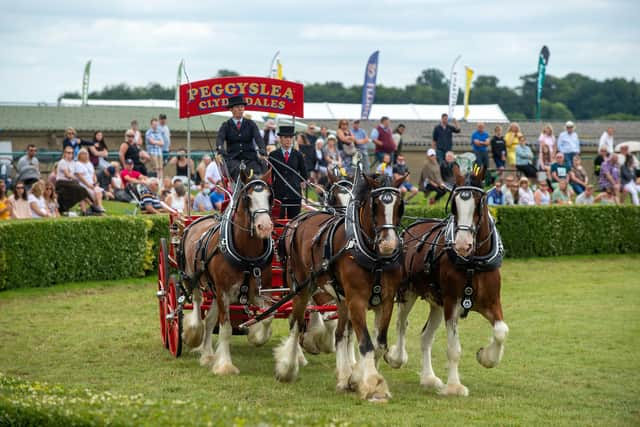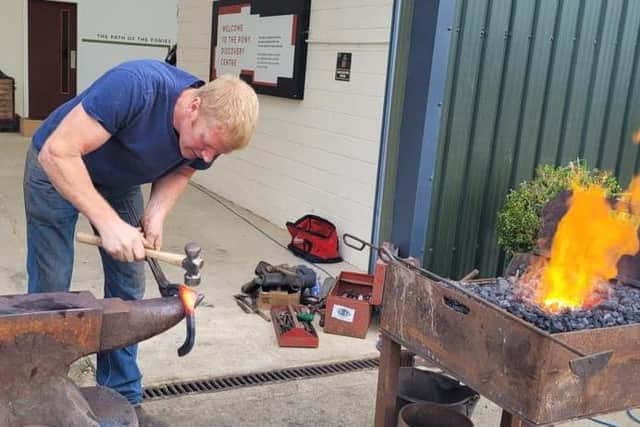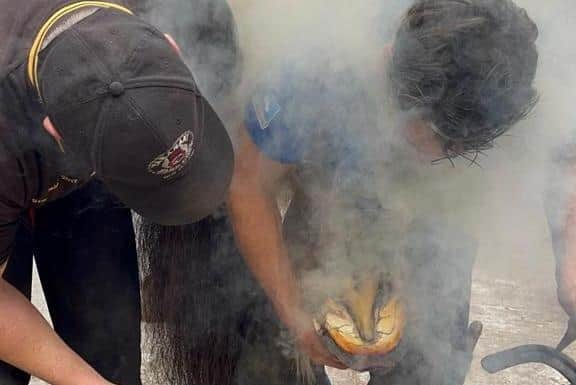Yorkshire farrier takes on teams from across the world as World Clydesdale Show comes home to the UK for the first time
The show, which features the The World Clydesdale Show Shoeing & Shoemaking Championship at the same time, is usually held in America but is taking place this weekend in Aberdeen, Scotland.
It is a first for the farrier competition to also be held in the UK, and in Scotland, and is an opportunity that no-one – from show executives, to its 2022 president actor Martin Clunes to Yorkshire’s representative wanted to miss out on.
Advertisement
Hide AdAdvertisement
Hide AdTom Pears is a farrier from Penistone in South Yorkshire and has been invited to form part of a Four Man Masters Team.


The first day of competition was held yesterday with the Four Man Team Heavy Horse Shoeing (Scotch Heels and Toe Bars all Round) in a three hour session.
Today is set to be a Four Man Team Heavy Horse Shoemaking to Judge specification shoe category and action continues tomorrow on the final day of farrier competition.
Teams are challenged to do three quarter fullered flat shoes with masselotte clips in a two and a half hour session. Afterwards there is opportunity for one shoe per team to be brought to the event already made which can be for any type of Draft Horse. The shoes will be auctioned off at the event and will be followed by prizegiving and a banquet in the evening for four man teams.
Advertisement
Hide AdAdvertisement
Hide Ad

With a big money prize – £10,000 awarded to the team in first place – Mr Pears and his team, who are based in Devon, Lincolnshire and Staffordshire, have been practising for months.
For Mr Pears, he has been shoeing the resident Clydesdale horse at The National Coal-Mining Museum where he looks after the horses, using his own portable forge.
Using his own forge at home he has been shoe-making as well as visiting the home of one of his team-mates who keeps his own Clydesdales.
He said: “We have been practising for the build up to it. Clydesdale shoeing is very different, it is three times as much as a normal horse.
Advertisement
Hide AdAdvertisement
Hide Ad

"When they asked me to take part I said I would be honoured, it is a great responsibility and you are part of a team and don’t want to let them down. We need a lot of luck and hopefully it goes well. We are four good competitors but these teams are some of the best in the world with world class judges.
"It is a great thing and will probably never be held in Europe again in our lifetime.”
The Clydesdale Society says the breed was founded in Lanarkshire and dates back from the middle of the 18th century when native horses of Lanarkshire were graded up in an effort to produce greater weight and substance by the use of Flemish stallions.
At its peak, Scotland had around 140,000 farm horses plus an unknown number in towns and cities, most of which were Clydesdales in whole or part.
Advertisement
Hide AdAdvertisement
Hide AdClydesdale horses were conscripted by the army to serve in The First World War and The Society says that exports began to be numbered in hundreds and during the period 1884 to 1945, 20,183 export certificates for stallions, mares and fillies were issued by the Society, the importing countries being not only the Dominions, but America, South America, Russia, Italy and Austria.In Britain, following the Second World War, the agricultural industry ramped up in terms of the need for productivity and this could only be achieved by the extensive use of the tractor and horses were replaced by mechanical power.
There are still only around 250 foals recorded in the stud book each year and in the 21st century the horses are not only being used for their traditional purposes of driving, farm work and logging but they have become more and more popular for riding, with Clydesdale ridden classes now being included at many shows along with the in hand classes.
The society said: “People with a love of the Clydesdale are not only rediscovering uses for the breed, but the associated skills such as harness making and shoeing.”
Mr Pears says working with heavy horses may be more rare for today’s farriers but requires a different skill set that he is keen to see maintained.
Advertisement
Hide AdAdvertisement
Hide AdHe said: “Competition for farriers in general is a great way to expose them to new shoes they would not normally do on an every day basis. A lot of the shoes we do in competitions are therapeutic, specialist, old-fashioned and no longer needed or used.
"It is a shame to lose that tradition and farriers that don’t compete have no need to make them and are missing out on that skill set.”

